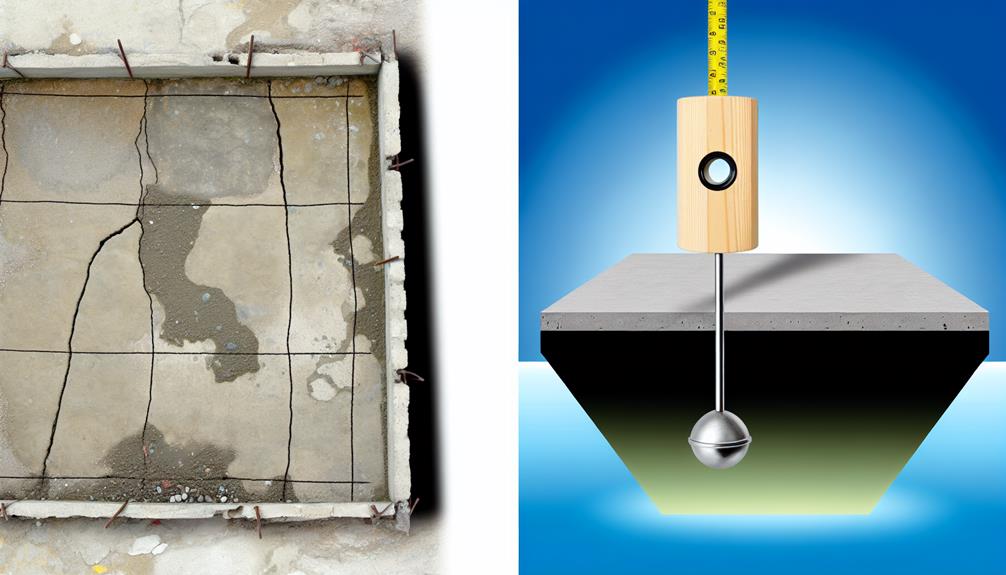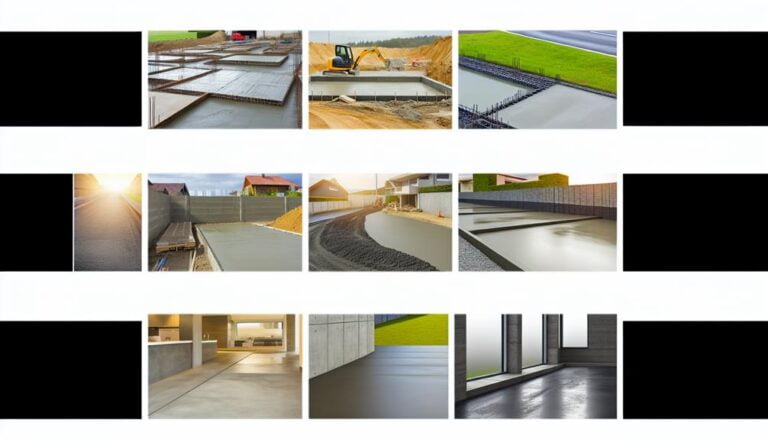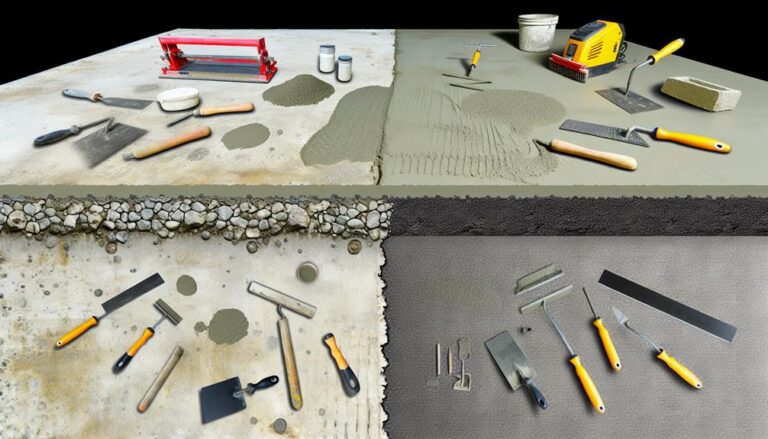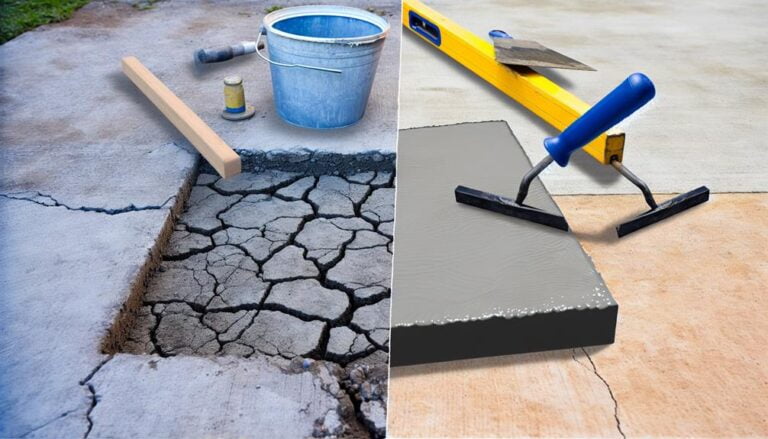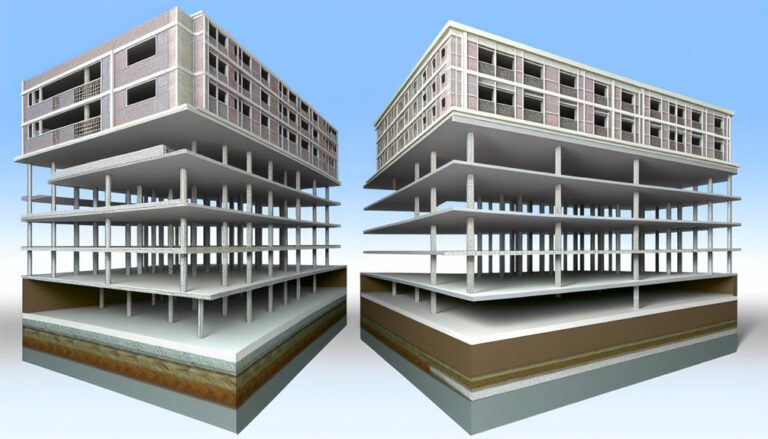What Makes Concrete Leveling Key for Stability?
Concrete leveling is crucial for your building's stability. It corrects uneven surfaces, ensuring proper weight distribution and preventing potential structural issues. This process requires accuracy and precision and is usually done by professional contractors. By leveling your concrete, you're avoiding issues like water pooling and wear and tear, enhancing both safety and structural integrity. Beyond reducing trip hazards, it prolongs the life of your property, making it safer and more durable. Remember, every bit of knowledge you acquire about concrete leveling processes and benefits brings you one step closer to a sturdier, safer construction project.
Understanding Concrete Leveling
To ensure a solid and stable foundation, it's crucial that you understand the process of concrete leveling. Essentially, it's a method used to correct uneven concrete surfaces by altering the foundation that the surface sits upon. You see, over time, the concrete can become uneven due to ground movement or erosion, and without proper correction, it can lead to serious structural issues.
Concrete leveling involves injecting a mixture, often a type of grout or polyurethane foam, under the concrete slab. This forces the concrete to rise and level out. It's a process that requires precision, as the amount of mixture injected needs to be carefully controlled to ensure an even surface.
Absolute accuracy is essential in this process. The leveling must be carried out meticulously, as mistakes can be costly and may lead to further damage. Professional concrete contractors are usually the best bet for this task, as they've the skills, tools, and experience to get the job done right.
Now, you're probably wondering about the importance of all this. Why does it matter if your concrete is level or not? That's what we'll dive into in the next subtopic. So, keep reading.
Importance of Concrete Leveling for Stability
Ensuring your concrete is level isn't just about aesthetics – it's a vital step in maintaining the stability and longevity of your structure. Unlevel concrete can lead to a variety of problems that compromise the safety of your structure.
Firstly, concrete that isn't level can cause instability. When concrete settles unevenly, it creates gaps and voids beneath the surface. This uneven distribution of weight can result in cracks and breaks, causing your structure to become unstable over time.
Moreover, uneven concrete can lead to water pooling in certain areas. This not only poses a safety hazard due to potential slipping but also speeds up the wear and tear of your concrete, as water can seep into the cracks and cause further damage.
Benefits of Level Concrete Surfaces
Having a level concrete surface offers numerous benefits, from enhancing your property's aesthetic appeal to increasing its overall safety and structural integrity. Imagine, you've just poured a new concrete surface; it's smooth, even, and adds to your property's beauty. That's not all; it's also safer and more durable.
When concrete is level, it can handle heavy loads better, reducing the risk of cracks and breakage. You won't have to worry about tripping hazards, either, which is essential if you've got kids running around or elderly family members who are prone to falls.
But let's break it down further. Here's a simple table that'll help you understand the concrete benefits you're getting:
| Benefit | What it Means | Long-term Impact |
|---|---|---|
| Aesthetic Appeal | Enhances the look of your property | Increases property value |
| Safety | Reduces tripping hazards | Prevents accidents and injuries |
| Durability | Withstands heavy loads | Decreases repair and maintenance costs |
| Structural Integrity | Reinforces building structure | Ensures longevity of the property |
With so many benefits, it's clear that having a level concrete surface isn't just about looks – it's about making your property safer, more durable, and long-lasting.
Applications of Concrete Leveling
Often, you'll find concrete leveling being used in various applications to maintain balance and stability. One such application is in the construction of buildings and infrastructures. Here, it's crucial to have a level surface as a base to ensure the structure's stability. Without it, you'd risk the building tilting or sinking, which could lead to significant damage and safety hazards.
Similarly, concrete leveling is vital in road construction. A level road surface improves driving conditions and reduces the risk of accidents. It also enhances the lifespan of the road by preventing water pooling, which can cause damage over time.
In the realm of landscaping, concrete leveling plays a significant role as well. Uneven surfaces can lead to water runoff problems, making your outdoor space less functional and visually appealing. Through concrete leveling, you can create a balanced, smooth surface that boosts the aesthetic and practical value of your property.
Moreover, it's applied in creating level floors in homes and commercial spaces. Uneven floors can cause trips and falls, making your space unsafe. Concrete leveling ensures your floors are safe, smooth, and comfortable to walk on. This way, you're not only enhancing safety but also boosting the overall appeal of your space.
Common Concrete Leveling Techniques
Now that you understand the importance of concrete leveling in various applications, let's explore some of the most common techniques used in this process.
First, there's mudjacking, also known as slab jacking. This technique involves pumping a mixture of water, soil, sand, and cement beneath the concrete slab. The pressure from this mixture lifts the concrete to the desired level. It's a widely used method due to its simplicity and effectiveness.
Next, we've polyurethane foam injection, or simply foam jacking. The process is similar to mudjacking but uses an expansive polyurethane foam instead. The foam expands beneath the concrete, raising it to the correct level. This method is popular because it's lightweight, provides a strong base, and requires fewer holes in the concrete.
Lastly, there's self-leveling concrete. This is a type of concrete that flows and spreads out evenly, filling in any dips or uneven surfaces. It's often used for indoor flooring and is favored for its fast application and smooth result.
Cost-Effectiveness of Concrete Leveling
While assessing the cost-effectiveness of concrete leveling, it's crucial to consider the method used, its long-term durability, and the potential savings in avoiding future repairs. Concrete leveling techniques, such as slabjacking or hydraulic jacking, may seem pricey initially. Still, you've got to understand that these methods provide a long-lasting solution to uneven concrete, eventually saving you from costly fixes down the line.
Imagine letting the uneven concrete sit as it is. Over time, the unevenness can worsen, leading to significant structural issues. Damaged concrete can cause safety hazards, like tripping, which could result in insurance claims or lawsuits. Besides, if you're planning to sell your property, leveled concrete can boost your property's curb appeal, potentially increasing its market value.
On the other hand, temporary fixes might seem cheaper, but they're just band-aid solutions that'll require more frequent repairs. So, when you're weighing the cost, don't just look at the upfront price. Consider the long-term implications as well. You'll find that investing in concrete leveling is a cost-effective solution in the long run, providing stability, safety, and aesthetic appeal.
Case Studies: Concrete Leveling Successes
To truly appreciate the benefits of concrete leveling, let's delve into some real-life success stories that highlight its effectiveness and efficiency.
Imagine a commercial building where the concrete floor had sunk by several inches, causing significant safety concerns and operational challenges. Traditional methods would've required extensive excavation, time, and money. But, thanks to concrete leveling, the issue was resolved within a single day. The concrete was raised to its original level, enhancing its stability and usability.
Now, let's take another case of a residential driveway. The homeowners noticed a drastic shift in the level of their concrete driveway due to soil erosion underneath. There was a potential risk of damaging their vehicles. Concrete leveling came to the rescue. The problem area was identified, and within a few hours, the driveway was back to its original level, ensuring the smooth movement of vehicles.
These examples demonstrate that concrete leveling isn't just a quick fix. It's an effective solution that provides stability and rectifies issues that could otherwise take days to resolve. It's a game-changer in situations where time, cost, and effectiveness are of utmost importance.
Ensuring Safety With Concrete Leveling
Beyond just providing stability, concrete leveling is a significant measure in ensuring the safety of your properties. An uneven concrete surface can be a safety hazard, leading to trips and falls. It's not just about aesthetics; it's about keeping everyone who steps on your property safe.
When you ignore uneven concrete, you're inviting potential injuries. Think about it: if someone trips on a raised section of your walkway, they could get seriously hurt. That's a risk you shouldn't take. Concrete leveling mitigates this risk by creating a smooth, level surface.
Additionally, concrete leveling protects your property from further damage. Uneven concrete often indicates underlying issues, like soil erosion or shifting. By addressing the leveling issue, you're also tackling these root problems, preventing more serious structural issues down the line.
Concrete leveling isn't just a quick fix, it's a long-term investment in the safety and integrity of your property. So don't overlook it. Prioritize concrete leveling in your property maintenance. It's a key step in ensuring your property is safe, secure, and stable.
Future Trends in Concrete Leveling
Innovation is paving the way in concrete leveling, and you stand to benefit from the emerging trends set to revolutionize this crucial aspect of property maintenance. With technology at the helm, we're witnessing a shift towards more efficient, sustainable practices.
Imagine a world where robots perform concrete leveling tasks. It's not far-fetched. Robotic technology's already making waves in the construction industry, and it's set to infiltrate concrete leveling. These machines are precise, minimizing errors, saving you time and money.
Sustainability's also on the rise. Companies are developing eco-friendly materials, reducing the industry's carbon footprint. You could soon be using green concrete, a product that's as durable as traditional concrete but environment-friendly.
Finally, there's a trend towards self-healing concrete. This material has bacteria that produce limestone when they come into contact with water, filling cracks that might appear over time. You won't have to worry about regular maintenance.
In a nutshell, the future of concrete leveling looks promising, filled with innovations that'll make your life easier and promote sustainability. So you can look forward to more efficient, cost-effective, and environmentally friendly concrete leveling solutions.
Frequently Asked Questions
What Are the Environmental Impacts of Concrete Leveling?
Concrete leveling has its environmental impacts.
It reduces waste by repairing instead of replacing slabs, saving resources. However, it uses energy and materials, contributing to carbon emissions. If done improperly, it may disrupt local ecosystems. Nevertheless, it's essential to balance these impacts with the benefits of stability, preventing structural damage and hazards.
You should always consider these factors when deciding to level concrete.
It's about making responsible choices for the environment.
Can Concrete Leveling Be Done as a DIY Project or Does It Require Professional Help?
Don't bite off more than you can chew. Concrete leveling can indeed be a DIY project, but it's not for the faint of heart. It requires specific tools, materials, and a good understanding of the process.
If you're not confident in your abilities, it's best to leave it to the pros. They've got the expertise to ensure it's done right, providing the key stability your property needs.
It's always better safe than sorry.
Are There Any Potential Health Risks Associated With Concrete Leveling?
Concrete leveling might expose you to some health risks. You're dealing with materials that can produce dust and harmful particles when mixed or handled. If you're not wearing proper protective gear, you can inhale these particles, which isn't good for your lungs.
Also, direct skin contact can cause irritations. It's important to follow safety guidelines to minimize these risks. Always wear protective gear like goggles, gloves, and a dust mask.
How Does Weather Affect the Concrete Leveling Process and Its Results?
Weather greatly impacts the concrete leveling process. If it's too hot, the concrete could dry too quickly and crack. Conversely, if it's cold, it mightn't cure properly. Rain can also disrupt the process, causing the mixture to become too thin.
You'll need to consider the forecast and plan accordingly to ensure a successful concrete leveling project. Remember, proper leveling is crucial for long term stability and durability of your concrete surfaces.
What Are the Best Practices for Maintaining a Leveled Concrete Surface Over Time?
To maintain a leveled concrete surface over time, it's essential to regularly inspect for signs of wear or damage. If you notice unevenness, get it repaired immediately. Use sealants to prevent water damage and apply a quality concrete conditioner.
Avoid heavy loads on the surface and ensure proper drainage. Regular cleaning's also vital. Remember, preventative maintenance's key to keeping your concrete surface leveled and prolonging its life.
Conclusion
So, you see, concrete leveling isn't just beneficial, it's essential. It's a key player in ensuring stability, safety, and cost-effectiveness in construction.
Did you know that incorrect leveling can increase repair costs by up to 30%? Take it from us, investing in proper concrete leveling today can save you from costly repairs tomorrow.
Keep an eye out for future trends in concrete leveling, it's an evolving field with much to offer.
